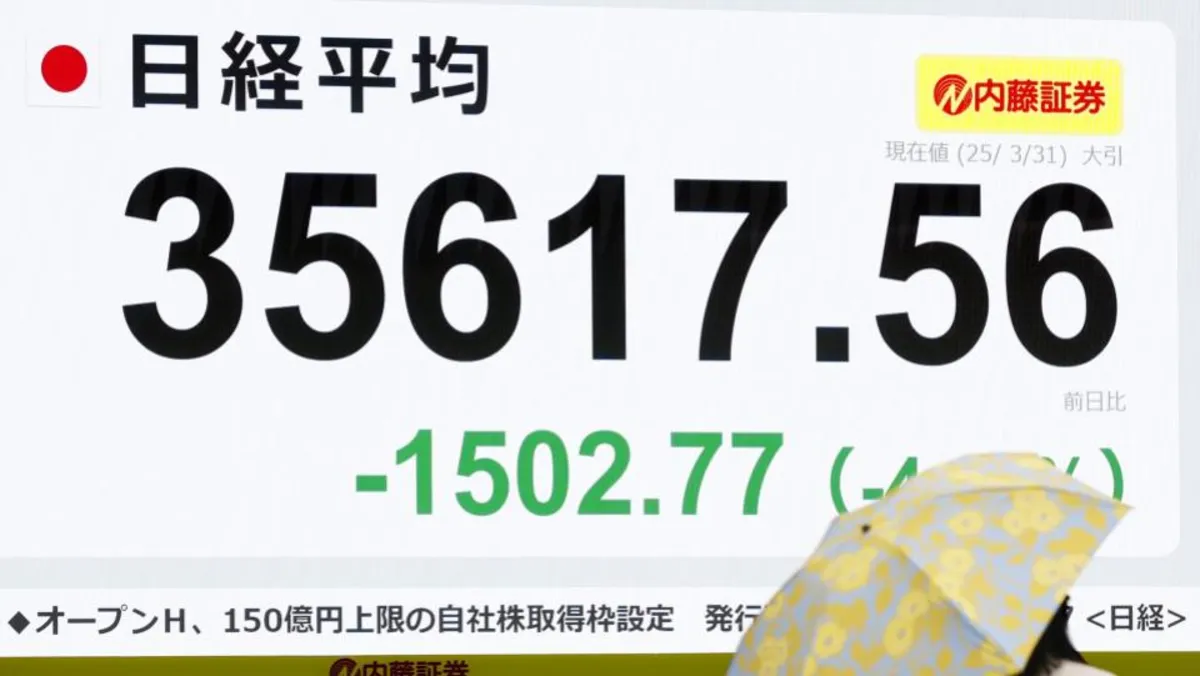
On Monday, marking the final day of Japan's 2024 fiscal year, Tokyo stocks experienced a significant decline, with the Nikkei index closing down 4 percent at a seven-month low. This substantial drop was fueled by growing apprehension regarding the negative impact of U.S. tariffs on the Japanese economy. The 225-issue Nikkei Stock Average fell by 1,502.77 points, or 4.05 percent, closing at 35,617.56—the lowest level since August 9th—and down 11.8 percent compared to the previous year.
The broader Topix index also faced losses, finishing 98.52 points, or 3.57 percent, lower at 2,658.73. Across all sectors of the top-tier Prime Market, declines were seen, with the most significant losses recorded in the insurance, nonferrous metal, and oil and coal product categories. This widespread downturn highlights the pervasive pessimism affecting investor sentiment.
In currency markets, the U.S. dollar briefly weakened to the upper 148 yen range in Tokyo. Traders noted that the yen, traditionally viewed as a safe-haven asset, was purchased amid fears of an impending economic slowdown in the United States, largely attributed to President Donald Trump's trade policies. At 5 p.m., the dollar was valued at 149.13-15 yen, a drop from 149.75-85 yen in New York and 150.38-40 yen in Tokyo at the same time on Friday.
Additionally, the yield on the benchmark 10-year Japanese government bond fell to a four-week low of 1.485 percent, a decrease of 0.060 percentage points from Friday's close. This drop indicates that investors are turning to government debt as a safe asset in response to the sharp decline in the Nikkei stock index.
The decline in the Nikkei benchmark closely followed the plunge in Wall Street stocks late last week, as fears intensified about a potential economic slump and persistent high inflation in the United States. Heavyweight technology stocks saw significant declines, mirroring the losses of their U.S. counterparts, while shares in the automotive sector were sold off in anticipation of Trump's impending 25 percent tariffs on all vehicles manufactured outside the United States, set to take effect on Thursday.
Concerns regarding the Japanese economy are beginning to surface, particularly regarding the expected adverse impact of the tariffs on the country's crucial auto industry. Kazuo Kamitani, a strategist at the Investment Content Department of Nomura Securities Co., noted that while optimism prevailed before Trump took office in January, the sentiment has markedly deteriorated due to a series of aggressive tariff announcements that have coincided with ongoing stock declines.
According to Masahiro Yamaguchi, head of investment research at SMBC Trust Bank, the market is beginning to feel the effects of these tariffs on the real economy in the United States, which is also impacting Japanese equities. Investors are struggling to assess the tariffs' impact comprehensively, as the U.S. administration has been slow to announce measures, raising the risk of further stock declines.
As the market reacts to the uncertainty surrounding U.S. auto tariffs and their potential ramifications on the Japanese economy, analysts urge caution. The situation remains fluid, and investors are advised to keep a close watch on developments in trade policies and their economic implications.